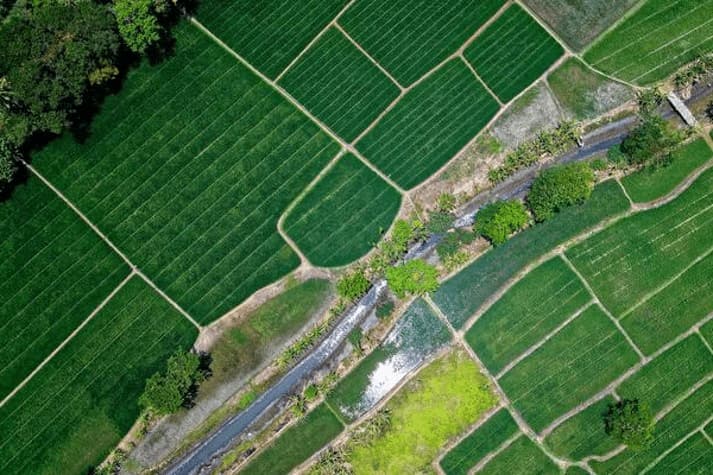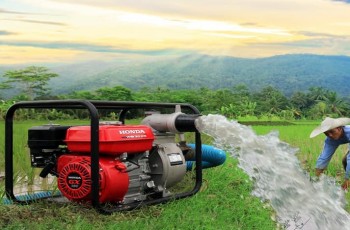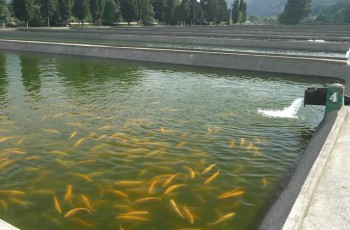8 Characteristics of Fertile Soil for Plants
26 December 2023

Indonesia is very well known for its rich natural resources and fertile soil, which leads to abundant harvests. However, Sobat Honda needs to recognize the characteristics of fertile soil beyond its appearance because not all soils in Indonesia are fertile.
Although in some cases, soil can be maximized for growing various crops, it's better to find soil with sufficient nutrient content Sobat Honda.
Water availability is a significant factor supporting soil fertility. If water is well-retained in the soil, it ensures uninterrupted plant growth. To meet your plants' water needs, ensure Sobat Honda has a high-quality water pump.
For instance, consider the WB20XN NF and WB30XN NF from Honda Power Products, which efficiently deliver a large volume of water in a short time. Honda Power Products incorporates advanced technology for easy usability.
Certainly, Honda Power Products' water pumps can fulfill the water requirements for your agriculture and plantation needs Sobat Honda. Want more information about high-quality water pumps? Visit Honda Power Products now.
While exploring various water pumps provided by Honda Power Products, let's also learn about the characteristics of fertile soil below!
What Is Meant by Soil Fertility?
Soil fertility refers to a soil's ability to provide optimal nutrients, water, and environmental conditions for plant growth and development. Fertile soil typically supports optimal plant life and production.
Several factors influence soil fertility, including nutrient content, soil structure, pH, moisture, and the presence of soil organisms. Among these crucial factors, nutrient content is one of the most important.
Plants require essential nutrients like nitrogen (N), phosphorus (P), and potassium (K) for healthy growth.
However, nutrients alone are not enough to ensure optimal plant growth. Sobat Honda should understand that soil structure also plays a vital role in the growth process of various plants.
Fertile soil usually has a good structure, meaning that soil aggregates formed by soil particles are well-bound. A good soil structure enables water and air circulation, facilitates root movement, and supports soil organism activity.
These soil aggregates greatly assist in water retention and reduce the risk of soil erosion. All the factors mentioned earlier should be carefully considered to ensure smooth crop cultivation, leading to maximize yields and better profits, Sobat Honda. Let's delve into the essential information about fertile soil in the following points.
Read Also: How To Maintain Soil Fertility?
8 Characteristics of Fertile Soil for Plants
Despite Indonesia's reputation for fertility, not all soils can sustain productive crops. Some soils are excessively dry and lack sufficient nutrients for plant growth. To avoid mistakes during planting, Sobat Honda should familiarize yourself with the following characteristics of fertile soil.
1. Adequate Nutrient Content
Fertile soil usually contains sufficient nutrients to meet the needs of plants. Essential nutrients like nitrogen (N), phosphorus (P), and potassium (K) should be available in adequate amounts.
Additionally, fertile soil contains essential microelements such as iron, manganese, zinc, copper, and boron, which plants require in small yet crucial amounts.
2. High Organic Fertility
Fertile soil is characterized by abundant organic matter. Organic materials, such as humus, play a vital role in enhancing soil fertility.
Humus helps improve soil structure, water retention, nutrient storage capacity, and provides additional nutrients as it decomposes. Soils with high humus content tend to be more fertile.
Read Also: 6 Types Of Fertile Soil Found In Indonesia
3. Good Soil Structure
Another characteristic of fertile soil is a well-developed soil structure. A good soil structure is formed by well-bound soil aggregates, creating channels for water, air, and plant roots to move through.
A good soil structure allows plant roots to penetrate easily, improves water drainage, and prevents erosion. Soils with good structure also have an ideal texture, which is a balanced mixture of sand, clay, and silt.
4. Balanced Soil pH
Soil pH is a measure of its acidity or alkalinity. Generally, fertile soil has a balanced or neutral pH, which falls between pH 6 and 7. Soil with the right pH allows plants to access nutrients efficiently.
Conversely, overly acidic or alkaline soil can hinder nutrient availability for plants. That’s why, maintaining a balanced soil pH is essential for enhancing soil fertility.
5. Good Drainage
Fertile soil is also characterized by good drainage. Proper drainage ensures that excess water can flow away, preventing water logging that could damage plant roots.
Soil with good drainage guarantees that it doesn't become waterlogged while still providing sufficient moisture for plant growth.
6. Adequate Water Availability
Proper water availability is another crucial factor in ensuring fertile soil. Usually, fertile soil can retain and maintain optimal moisture for plant growth.
The soil's ability to store and provide access to water for plant roots is vital in the growth process. Adequate water availability helps ensure plants receive sufficient water supply, ensuring undisturbed plant growth.
7. Active Soil Organisms
Fertile soil is also characterized by the presence of active soil organisms, such as bacteria, fungi, and earthworms. These organisms aid in the decomposition of organic matter, improve soil structure, and provide additional nutrients for plants.
The activity of soil organisms enhances air and water circulation in the soil and helps increase nutrient availability in forms that are accessible to plants.
8. Water Retention Capacity
Another characteristic of fertile soil is its excellent water retention capacity. The soil should be able to retain water effectively and gradually release it to plants.
This water retention ability helps plants maintain soil moisture and prevents them from experiencing drought. Soil with good water retention capacity also minimizes water loss through evaporation, ensuring the plants' water needs are met.
With the explanations of the characteristics of fertile soil above, hopefully, Sobat Honda now understands the importance of various nutrients and other factors for the growth of productive crops. When Sobat Honda uses fertile soil for farming and plantation activities, you can expect a satisfying harvest.
In addition to using fertile soil, make sure Sobat Honda is already equipped with the best tools to facilitate your work. For example, consider purchasing water pumps from Honda Power Products, which are known for their safety and durability.
Read Also: 5 Ways To Tackle Agricultural Land Drought
Sobat Honda can view your purchase as a long-term investment since Honda Power Products' water pumps are designed with the best technology and materials to ensure customer satisfaction. Bid farewell to damages or other issues by switching to high-quality water pumps from Honda Power Products today!

Honda Power Products Indonesia
Honda Power Products menyediakan mesin serbaguna, generator, pemotong rumput, pemotong sikat, pompa air, dan mesin tempel.



